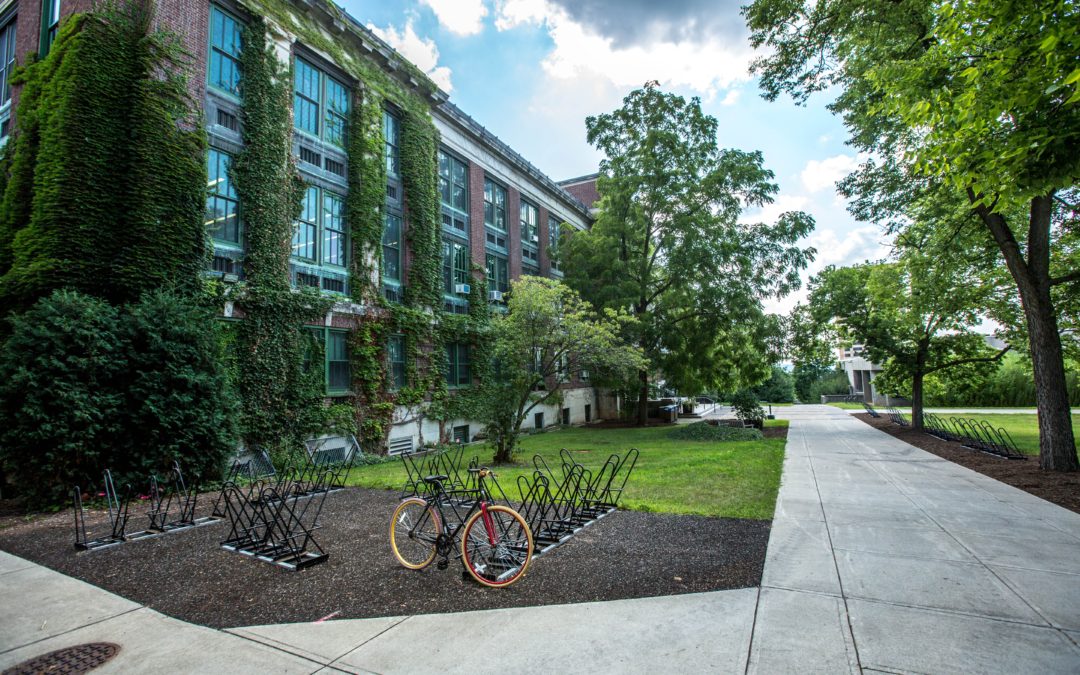Though not essential, college visits are the very best way to get a feel for a campus. You can picture where you might study in the library, which patch of grass you may lay on during sunny days, what the hallways sound like in the department you foresee spending a whole lot of time.
But, you want to use your time wisely. To make the most of your college visits, follow these tips. And if you aren’t in the position to visit your dream schools, skip down to tip No. 9 to learn about virtual tours and how to access student reviews.
1. SCHEDULE AHEAD
A big chunk of your campus visit will involve participating in a tour or info session (or both). But, especially in the fall, these tours can get booked up. So, make sure you schedule your tour ahead of time. Most colleges allow you to do this online with easy-to-follow instructions for how to book.
While researching tours, it’s likely you’ve read that it’s best to visit schools while they’re in session so you can get a feel for student life. While this is true, don’t despair if you have to visit over the summer or during a reading week. Schools are never ghost towns, no matter the time of year, so you’ll always get some idea of what life is like there. What matters most is what fits into your schedule, especially if you’re doing your college visits in a clump.
2. SCHEDULE AN INTERVIEW, IF OFFERED
When you look at the online portal for booking tours, you’ll see that some schools offer the opportunity for an interview. If so, take it!
Admissions officers want to know that you’re seriously considering their school. If you take the time to interview, and, during it, you are able to convey how intelligent, enthusiastic, insightful and committed you are, it’s akin to sticking a gold star on your application.
For more information on how to prepare for an interview, click here and here.

3. WEAR COMFORTABLE SHOES
If you’re going to interview, I recommend dressing neatly and somewhat formally. It’s less important if you’re just taking a tour. Either way, make sure to wear shoes you can easily walk a few hours in. My stepdaughter and I learned this the hard way, so learn from our mistake: wear flats.
4. ASK QUESTIONS
As you take your tours, you’ll quickly learn that tour guides have a rote spiel they go (and even walk) by, which covers topics like campus safety, student-to-teacher ratio, clubs and organizations, study abroad and interesting tidbits and stories about the school. They also often end the tours by specifically explaining what clinched their decision to choose the college they attend.
This is all useful information, but it is a sales pitch as well. In order to cut through it, don’t hesitate to ask specific questions. Ask:
- about study groups, peer support, tutor availability
- if there is anywhere on campus where you can get your computer fixed
- if there is air-conditioning in the dorms
- about the percentage of students who participate in Greek life
- about which clubs are most popular
- if you need a bike to get around
- if there is ample student parking
Your tour guide is, after all, a student, and once they go off message, they’re usually pretty candid. So, if you need an answer to something in order to more accurately picture what your life might be like there, don’t hesitate to ask.
5. TOUR YOURSELF
It’s likely you’ll feel a little brain dead after an info session and tour, so I strongly recommend walking and driving around campus beforehand. You’ll feel fresh, maybe even excited, and college campuses are just pretty places to be.
If you’re particularly extroverted, don’t hesitate to talk to students on campus, even just to ask directions. You then might explain why you’re there and if they have any insight to share about what they like and don’t like about the school. You could approach professors in the same way.
I’m often too shy for that kind of interaction, and if you are too, don’t worry. I write more in Tip No. 9 about how to find out what students think about their school without actually having to talk to them.

6. EAT THERE, READ THERE, WATCH AND EAVESDROP
While on campus, you’re doing yourself the best service if you can spend as much time as possible there. As such, have lunch in one of the cafeterias to get an idea of what’s offered and how it tastes. Read a student newspaper to learn about campus politics and happenings. Scan bulletin boards to see what kinds of events are taking place and speakers who are coming. And finally, use your best observation skills: listen to what students are talking about and watch what they’re doing.
7. SLEEP THERE
I only recommend an overnight stay on campus once you’ve narrowed down your picks to a very small number. You will be amazed at how eye-opening (and exhausting) this type of visit is. You’ll sleep in a dorm, you’ll see what games students play in the common areas, you’ll eat there and hear about the food, you can ask about what they’re studying, and you’ll truly be able to assess if you can foresee finding a place for yourself in this place.
8. DOCUMENT YOUR COLLEGE VISITS
Especially if you’re doing several college visits, it’s easy for them to run together. It’s also easy to be sure about one place, until you get to the next one, which you might like more. So, make sure to take some notes after you’re finished (or your parents are driving to the next destination) to keep things straight (and objective) in your mind.
Also, many schools ask that you write supplemental essays explaining why you want to attend their school in particular. I call these “Why I want you” essays, which are not always easy to write. The key to them is in being specific and, after your college visit, you should have the details necessary to make your essay stand out. For more about “Why I want you” essays, click here.
9. STUDENT REVIEWS AND VIRTUAL TOURS
If you can’t make it to a college visit, or if you just want to refresh your memories of one, go to one of these amazing (free) sites online that offer virtual tours. Click here for:
You Visit in particular essentially offers the school tour that you would take, complete with a guide explaining highlights of the school.
With these sites, you can both get to know the campus and get information for your supplemental essays.
In addition, there are niche.com and unigo.com, which offer tons of student reviews of their school. Definitely make a point of scanning through some reviews, whether you visit a campus in person or not.
Ultimately, you are on the cusp of an exciting time. Follow these tips and you will be well prepared to have a terrific college visit. And, as always, if you have any questions, don’t hesitate to contact me at tara@swayessay.com.

